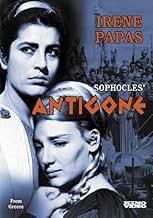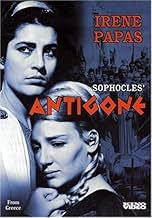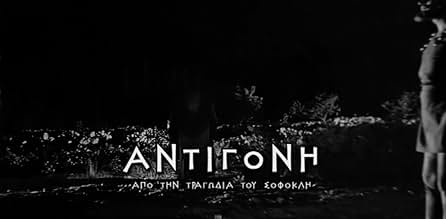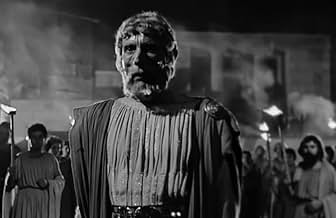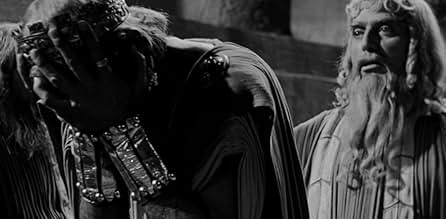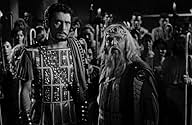NOTE IMDb
7,2/10
949
MA NOTE
Ajouter une intrigue dans votre langueAntigone defies her uncle's decree that her traitorous brother should go unburied and therefore find no rest in the afterlife; however, her actions have tragic consequences.Antigone defies her uncle's decree that her traitorous brother should go unburied and therefore find no rest in the afterlife; however, her actions have tragic consequences.Antigone defies her uncle's decree that her traitorous brother should go unburied and therefore find no rest in the afterlife; however, her actions have tragic consequences.
- Réalisation
- Scénario
- Casting principal
- Récompenses
- 3 victoires et 1 nomination au total
Yorgos Karetas
- Elder of Thebes
- (as Giorgos Karetas)
Mimis Rougeris
- Elder of Thebes
- (as Dimitris Rougeris)
Avis à la une
This film, seen in my youth, has etched itself indelibly into my psyche. Achingly bleak, this story of a sister's love is portrayed in a classical style, with Irene Pappas powerfully projecting the character of the title role. This is a worthwhile way to use your valuable time.
Easy to define it as inspired adaptation of Sophocles play. The superb Antigone proposed by Irene Papas, Creod isolated in his convinctions and fears and presumed vulnerabilitz, well performed by Manos Katrakis , Maro Kodou as Ismene or Ilia Lyvikou as Euridyce are the good reasons to see it as exceptional adaptation.
But the basic reason remains the option of Giorgos Tzavellas to suggest a direct interogation to audience.
Gestures in name of justice.
Laws and attitudes.
Radical answers against injustice.
And falls.
Indeed, all known from the Old Greek or Philosophy classes , from lectures of early ages , from other adaptations.
But the strong virtue of Irene Papas to be one with her character , maybe the language itself , maybe the set are details giving to this Antigoni a profound special status . And this makes it real different.
But the basic reason remains the option of Giorgos Tzavellas to suggest a direct interogation to audience.
Gestures in name of justice.
Laws and attitudes.
Radical answers against injustice.
And falls.
Indeed, all known from the Old Greek or Philosophy classes , from lectures of early ages , from other adaptations.
But the strong virtue of Irene Papas to be one with her character , maybe the language itself , maybe the set are details giving to this Antigoni a profound special status . And this makes it real different.
Most people who watch this film will be doing it in order to see an example of a classic Greek tragedy. They will be satisfied. It is dignified, stately, and absolutely dripping with fate, destiny, and tragedy.
But what if you are more like an average movie-goer? Does it hold up under more normal criteria? I think it does to some extent, but not particularly well. The plot is started at the very beginning of the opening scene as Antigone expresses her determination to bury her dead brother, and everything else follows inevitably - the entire story is plot-driven. It's a rather simple plot, but it does carry you along. I'm not sure there's a lot more that's really compelling about the film. It's pretty stagey, with actors and extras forming nice patterns, as if lining up with chalk lines on the floor. Although there are a number of small processions and such, this is not a costume epic with a cast of thousands and crane shots filling the screen with colourful eye candy. It's filmed in black and white. Is the acting good? Sure, but bear in mind that the range of emotions is quite limited, and characters pretty much talk in set speeches. They do imbue their dignified speeches with the correct emotions and make them sound sincere.
But, to be honest, I don't think you would recommend this film to anyone unless they had a pre-existing interest in classical Greek drama.
But what if you are more like an average movie-goer? Does it hold up under more normal criteria? I think it does to some extent, but not particularly well. The plot is started at the very beginning of the opening scene as Antigone expresses her determination to bury her dead brother, and everything else follows inevitably - the entire story is plot-driven. It's a rather simple plot, but it does carry you along. I'm not sure there's a lot more that's really compelling about the film. It's pretty stagey, with actors and extras forming nice patterns, as if lining up with chalk lines on the floor. Although there are a number of small processions and such, this is not a costume epic with a cast of thousands and crane shots filling the screen with colourful eye candy. It's filmed in black and white. Is the acting good? Sure, but bear in mind that the range of emotions is quite limited, and characters pretty much talk in set speeches. They do imbue their dignified speeches with the correct emotions and make them sound sincere.
But, to be honest, I don't think you would recommend this film to anyone unless they had a pre-existing interest in classical Greek drama.
Moral claims do not give rise to philosophical grounds. Yet, In Antigone it is clear that moral actions prompt philosophical questions, and inherently make good drama.
This review acts as a strict focus on how moral and ethical points are made throughout the film, and how they act as catalysts to progress the story and keep the viewer involved. Be it known that I have not read the Sopheclean text of Antigone, and fully derive all of my comments and criticisms solely within the boundaries of the film.
The character flaws present in the film mostly derive from wayward and distorted adherences to moral ideologies. For example, Antigone's ethical and moral backbone throughout the film is guided by powerful intangibles like love and loneliness, which makes her rash and at times misguided. Creon's moral code is also in knots as he acts as a Euthyphro in the fact that he is conflicted and contradictory to many of his beliefs that shape him, i.e. his aforementioned moral code.
Values undoubtedly shaped the society of Ancient Greece. Loyalty was a cornerstone value in this society, yet loyalty drifts and fades as tides turn in Antigone. For example, as Creon is crowned King of Thebes he is shown immediate support as the new benevolent King, yet mourning for Oedipus, or any mention of him whatsoever is non existent. Is this a loyal Thebes? Though support of Creon was warranted by his grace, the remembrances of a fallen king laid flat.
As Creon sits on his thrown surrounded by his court he states, "The country's foe is always mine." Little did Creon know that he was the biggest threat to his country, and thus his own foe. Because of the nature of Greek Tragedies and the intuition of most people, the common viewer could understand this at first glimpse. It was clear that Creon's hubris and pride would be his downfall.
Antigone, acting as the protagonist in the film, is the embodiment of good. Yet, contradictions within her moral ideology leads to questioning what "good" actually is. Is her entire moral and ethical embodiment good? Is it her choices of which moral standpoints to act upon that are what is good? Or is it her actions that are good? Simply put, Antigone is a walking paradox. It is impossible to know what is good. Acting against Zeus due to her undying love and care for her brother, or burying her brother because it is just in the Gods' eyes to do so. Both are contradictory and both can be good.
It is clear that both the protagonist and antagonist have inner conflicts. Their inner ideologies contradict. What makes one a "protagonist" and another an "antagonist" lies in the fact that the shared ideologies between them also conflict. Inner contradictions within an individual which conflict with another individuals already clashing ideologies makes it impossible to know who is right and who is wrong. Both characters were acting upon the same ethical grounds. They acted to safeguard human law, religious law, and family values. Is it then that moral grounds are shaped by convenience and circumstance? Does one's moral backbone fit the skeleton of a different distortion of themselves? Is moral rectitude a variable of space and time? Is it the contradictions of moral standpoints that are convenient because they can be malleable to fit any form? These are the questions that I believe the film poses.
The film does a fantastic job at examining exactly what grants a legitimate moral claim or action, which most people are curious about. Reason is man's most precious gift, and by the will of nature, the tone of his reasoning is determined by his moral code.
This review acts as a strict focus on how moral and ethical points are made throughout the film, and how they act as catalysts to progress the story and keep the viewer involved. Be it known that I have not read the Sopheclean text of Antigone, and fully derive all of my comments and criticisms solely within the boundaries of the film.
The character flaws present in the film mostly derive from wayward and distorted adherences to moral ideologies. For example, Antigone's ethical and moral backbone throughout the film is guided by powerful intangibles like love and loneliness, which makes her rash and at times misguided. Creon's moral code is also in knots as he acts as a Euthyphro in the fact that he is conflicted and contradictory to many of his beliefs that shape him, i.e. his aforementioned moral code.
Values undoubtedly shaped the society of Ancient Greece. Loyalty was a cornerstone value in this society, yet loyalty drifts and fades as tides turn in Antigone. For example, as Creon is crowned King of Thebes he is shown immediate support as the new benevolent King, yet mourning for Oedipus, or any mention of him whatsoever is non existent. Is this a loyal Thebes? Though support of Creon was warranted by his grace, the remembrances of a fallen king laid flat.
As Creon sits on his thrown surrounded by his court he states, "The country's foe is always mine." Little did Creon know that he was the biggest threat to his country, and thus his own foe. Because of the nature of Greek Tragedies and the intuition of most people, the common viewer could understand this at first glimpse. It was clear that Creon's hubris and pride would be his downfall.
Antigone, acting as the protagonist in the film, is the embodiment of good. Yet, contradictions within her moral ideology leads to questioning what "good" actually is. Is her entire moral and ethical embodiment good? Is it her choices of which moral standpoints to act upon that are what is good? Or is it her actions that are good? Simply put, Antigone is a walking paradox. It is impossible to know what is good. Acting against Zeus due to her undying love and care for her brother, or burying her brother because it is just in the Gods' eyes to do so. Both are contradictory and both can be good.
It is clear that both the protagonist and antagonist have inner conflicts. Their inner ideologies contradict. What makes one a "protagonist" and another an "antagonist" lies in the fact that the shared ideologies between them also conflict. Inner contradictions within an individual which conflict with another individuals already clashing ideologies makes it impossible to know who is right and who is wrong. Both characters were acting upon the same ethical grounds. They acted to safeguard human law, religious law, and family values. Is it then that moral grounds are shaped by convenience and circumstance? Does one's moral backbone fit the skeleton of a different distortion of themselves? Is moral rectitude a variable of space and time? Is it the contradictions of moral standpoints that are convenient because they can be malleable to fit any form? These are the questions that I believe the film poses.
The film does a fantastic job at examining exactly what grants a legitimate moral claim or action, which most people are curious about. Reason is man's most precious gift, and by the will of nature, the tone of his reasoning is determined by his moral code.
The play 'Antigone', written by Sophocles in 441 BC is not just a great piece of theatre but also raises political, ethical and philosophical issues which render it timeless. The blind Tiresias upbraids King Creon with 'All tyrants are gluttons for their ill-gotten power' and warns him that he will pay a terrible price for having denied Polyneices burial and condemning Antigone to entombment.
Athenians at the time would certainly have related to the folly of tyranny.
Unlike most 'absolute rulers' he relents but alas too late.
This is a very accomplshed adaptation by writer/director Yorgos Tzavallas with a fine score by Argyris Kournadis.
The cast is uniformly excellent. The striking Irene Papas, no stranger to tragic Greek heroines on both stage and screen, deservedly won an award at the Berlin International Film Festival for her performance as Antigone. Her character arouses our sympathy but one should not forget that her grim fate and the play's tragedy stems as much from her own stubbornness as from Creon's intractability. Manos Katrakis is absolutely stupendous as Creon. He too was recognised for his performance at the International Film Festival in San Francisco. Papas and Katrakis went on to excel in 'Electra' for Cacoyannis two years later.
One does not have to be a classical scholar to appreciate this first class film but should seeing it arouse ones interest in the wonders of Greek tragedy then it has more than served its purpose.
Le saviez-vous
- AnecdotesThe movie sold 43,705 tickets. It came in 12th out of 68 movies.
- ConnexionsReferenced in Dinos Katsouridis: Mia zoi san sinema (2012)
Meilleurs choix
Connectez-vous pour évaluer et suivre la liste de favoris afin de recevoir des recommandations personnalisées
- How long is Antigone?Alimenté par Alexa
Détails
- Date de sortie
- Pays d’origine
- Langue
- Aussi connu sous le nom de
- Antigone: A Tragedy by Sophocles
- Lieux de tournage
- Alfa Studios, Athènes, Grèce(Studio)
- Société de production
- Voir plus de crédits d'entreprise sur IMDbPro
- Durée1 heure 33 minutes
- Couleur
- Mixage
- Rapport de forme
- 1.37 : 1
Contribuer à cette page
Suggérer une modification ou ajouter du contenu manquant


